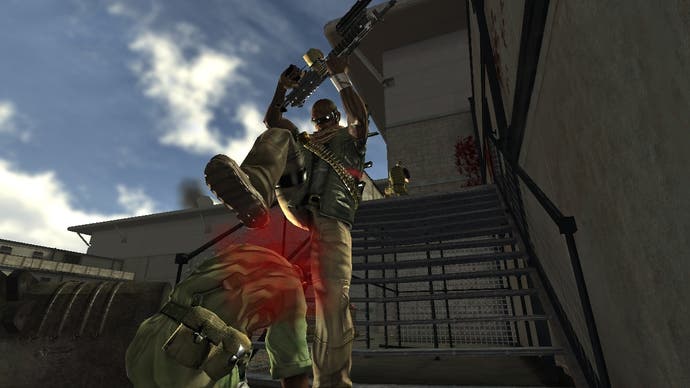Conflict: Denied Ops
Super sharp shooter?
Blast factor
It's this system, Watts says, which sets Denied Ops apart from all the other shooters on the shelves. Here's hoping he's right, as it's tricky to point to much else that's unique. Visually the game looks solid but it's far from stunning. Much has been made of the new Puncture Tech featured in the game. Sure enough, wood shatters pleasingly, bullets leave proper holes in walls and it's satisfying to blast through plasterboard straight into the enemy on the other side. None of this marks a radical new step for the genre, however.
A lot of the levels look familiar if you've played a few shooters. There are boxes and random bits of wall to hide behind everywhere, along with an awful lot of pillars and doorways. In the version we played enemies popped up in the same places each time, so it didn't take long to work out a strategy for taking them out. Rather too often, said strategy involved exploding one of the many fuel barrels littered around levels.
It's not just the level layouts that make Denied Ops feel more arcade in style than previous Conflict games. There's a new health system where you can revive your downed partner by finding their body and administering an injection. There's no limit to the amount of ammo you can carry, although you only have space for a few grenades, and supply boxes are provided liberally.
Joint task force

All the same rules apply in the game's co-op mode, which is playable via splitscreen, system link and online. "Everything in the single-player is recreated in the co-op mode so you're not missing out on anything. All the destruction is still there, nothing's been tapered back at all," says Watts.
"The good thing is you can share saves between the single-player game and the co-op game. So if you're playing solo and you're halfway through a level, you can go online and someone can jump in and join you halfway through the campaign."
There are also competitive multiplayer modes but Eidos is keeping these under wraps for now. They took a similar approach with Kane & Lynch, holding a separate preview event just for the Fragile Alliance mode. Kristan described it as "a fascinating concept, and one that helps restore the value to what might have otherwise been a lightweight package".
Hardcore Conflict fans should probably be hoping they're holding back on something similarly impressive for Denied Ops, because as it stands the game seems to lack the complexity and depth they're used to. However, Pivotal has been honest about its intentions to make the game simpler for casual players to pick up and play - and it looks like they've succeeded. Whether it will also offer enough long-term value and original ideas and to appeal to all sections of the gaming audience remains to be seen.

